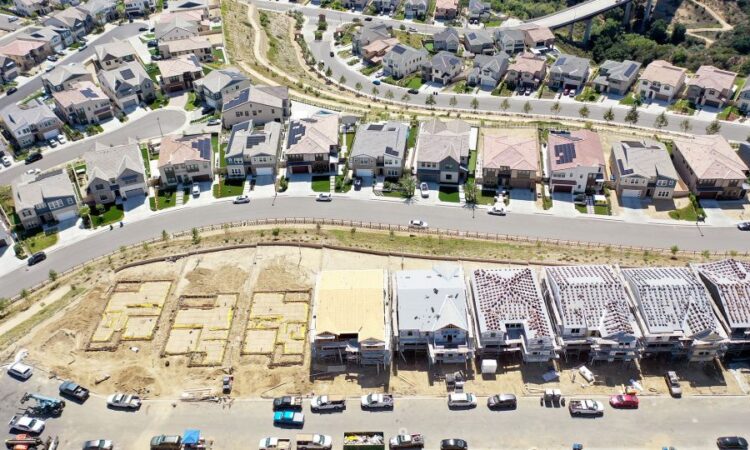
Amid a housing shortage and an affordability crisis, US homebuilding heated up in February as builders anticipate demand for new homes to stay strong.
One sure way to improve affordability is to increase the availability of apartments to rent and homes to buy. In areas of the country where there has been robust homebuilding, rents and home price increases have been more moderate.
The pace of new housing starts soared by 10.7% in February from the month before, after slumping in January, according to data released Thursday by the Census Bureau and the Department of Housing and Urban Development.
Starts rose to a seasonally adjusted annual rate of 1.521 million units last month, beating analysts’ estimates of 1.425 million. The pace rebounded from January’s revised pace of 1.374 million and was 5.9% above the 1.436 million pace a year ago.
Meanwhile, the pace of new building permits was up 1.9% from January, which was up 2.4% from a year ago.
Homebuyers look to new construction for much-needed inventory
While the number of existing homes on the market remains historically low, new construction has provided a critical alternative for homebuyers.
Mortgage applications for a newly constructed home were up a whopping 15.7% in February from a year ago, according to the Mortgage Bankers Association; and up by 1% from January. The average loan size jumped to its highest level since last March at almost $406,000, but it was still below the record high of more than $436,000 in April 2022.
“It is possible that we could see more wiggle room on pricing in the coming months, as the inventory of existing homes begins to expand,” said Lisa Sturtevant, chief economist at Bright Multiple Listing Service, in a statement.
Prospective homebuyers who are looking at new construction are still finding some builders offering concessions, upgrades, or favorable financing terms, she said.
But, according to the NAHB, fewer builders are offering price cuts.
Homebuilders are preparing for when rates are lower
The much lower mortgage rates that many homebuyers expected have yet to materialize, but builders want to be ready for when that does happen.
Mortgage rates have come down from their highest levels of last year — 7.79% in October — and are now about a full percentage point below that, at 6.74%.
“Lower mortgage rates are likely to bring buyers to the market in larger numbers, and builders are ramping up supply to meet this demand,” said Kelly Mangold of RCLCO Real Estate Consulting, in a statement.
While existing home inventory has ticked up lately, as is typical this time of year, there is still a historically low number of homes on the market as owners see the gap between their ultra-low rate and prevailing rates as still too wide.
That creates an opportunity for homebuilders who can provide inventory.
“Homebuilders continue to be bullish about the spring market as homeowners are still reluctant to list their homes for sale and new homes account for an outsized share of the active inventory,” said Sturtevant.
Homebuilder confidence improved this month even as mortgage rates climbed, according to a survey from the National Association of Home Builders released Monday.
The lack of existing inventory that continues to push buyers toward new home construction led homebuilder sentiment index to the highest level since July and marked the fourth consecutive monthly gain for the index.
Addressing the housing shortage
Housing affordability amid high inflation and elevated interest rates remains a hot-button issue for the White House as well as the Federal Reserve.
President Joe Biden is set to address the housing shortage Tuesday in a speech from Las Vegas, where the cost of rent has increased 30% from before the pandemic and the cost to buy a home has risen by over 40% since then.
Biden is expected to call on Congress to pass legislation that he says could result in the building and renovation of more than 2 million homes to close the housing supply gap and lower housing costs.
Housing experts agree there are not enough homes available to rent or own compared to the demand. But the size of that gap ranges from a shortfall of 1.5 million units (according to National Association of Home Builders) to 5.5 million units (according to the National Association of Realtors) or as many as 7 million (according to the National Low Income Housing Coalition and Realtor.com), depending on who is calculating it and what assumptions about housing are being made.
For more CNN news and newsletters create an account at CNN.com






